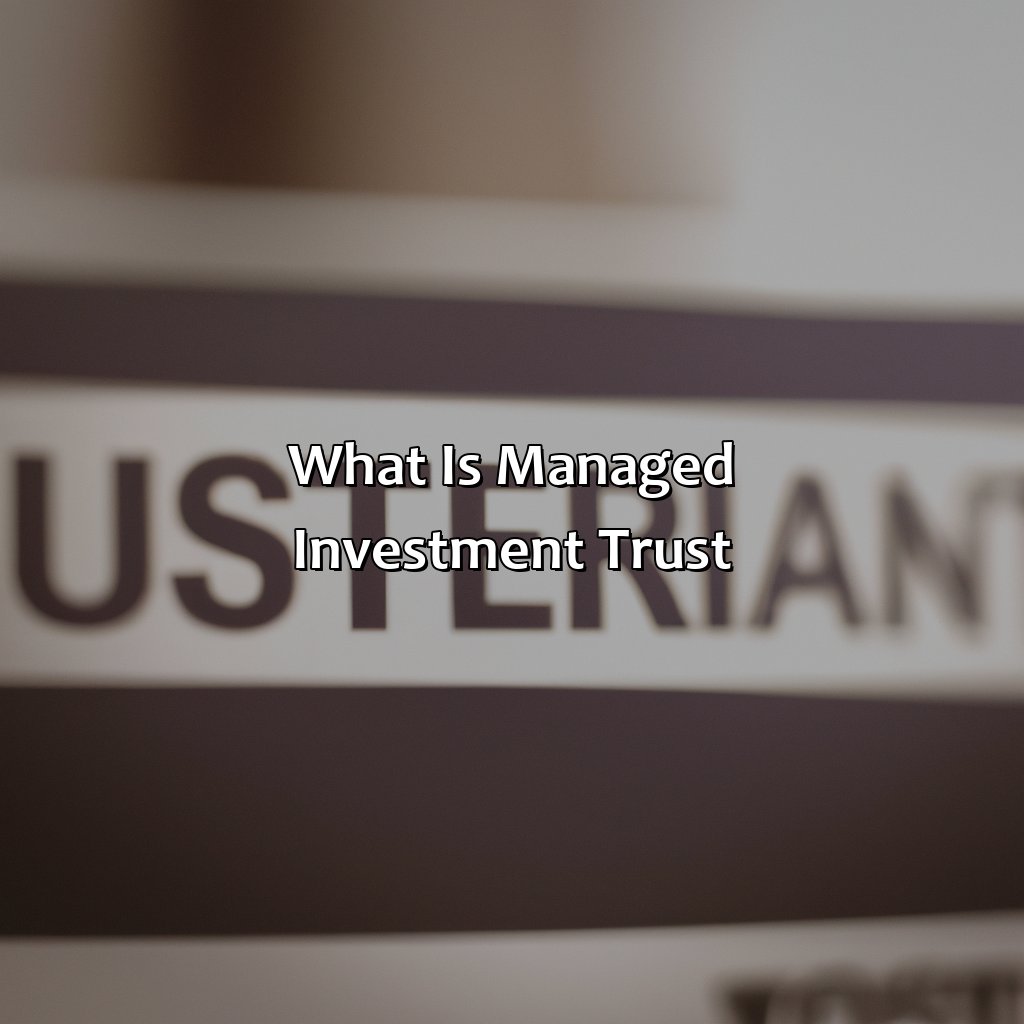What Is Managed Investment Trust?
Key takeaway:
- Managed Investment Trusts (MITs) are investment vehicles where investor funds are pooled and managed by professional fund managers with the aim of generating returns for investors.
- MITs offer investors diversification, professional management, and liquidity in various asset classes such as equity, property, and fixed income. This is particularly beneficial for retail investors who lack the resources or expertise to manage their own investments.
- Investing in MITs does come with certain disadvantages such as fees and lack of control over investment decisions, however, the benefits of access to professional management and diversification may outweigh the costs for some investors.
Are you looking for a way to invest your money with better returns? Managed Investment Trust (MIT) could be a great option for you. With MIT investments, you get the benefit of a team of experienced professional fund managers managing your portfolio, giving you higher returns with little effort.
Definition of a Managed Investment Trust
A Managed Investment Trust is a type of investment fund where the assets of the trust are managed by a professional fund manager. This fund manager will make investment decisions on behalf of the investors, with the aim of achieving the fund’s investment objective. The investors in the trust will hold units, which represent their share of ownership in the trust’s assets. Managed Investment Trust also has the advantage of being able to pass through tax credits and income to its investors.
It is important to note that Managed Investment Trusts are regulated by the Australian Securities and Investments Commission (ASIC) and must meet certain requirements to be eligible for this treatment. These requirements include restrictions on the types of assets that the trust can invest in, as well as requirements around the distribution of income and capital gains.
One unique feature of Managed Investment Trusts is that they have the ability to distribute capital gains to their investors in a more tax-effective way than traditional investment structures. This is because Managed Investment Trusts are able to stream capital gains to investors who have realised capital losses, which can be used to offset their gains.
To maximise returns from a Managed Investment Trust, investors may consider diversifying their investment across multiple trusts, which can help to spread risk and avoid concentration in one particular asset or sector. Additionally, investors should pay close attention to the fees charged by the trust, as these can impact overall returns. Choosing a Managed Investment Trust with low fees and a strong track record of performance can help to maximise returns over the long term.
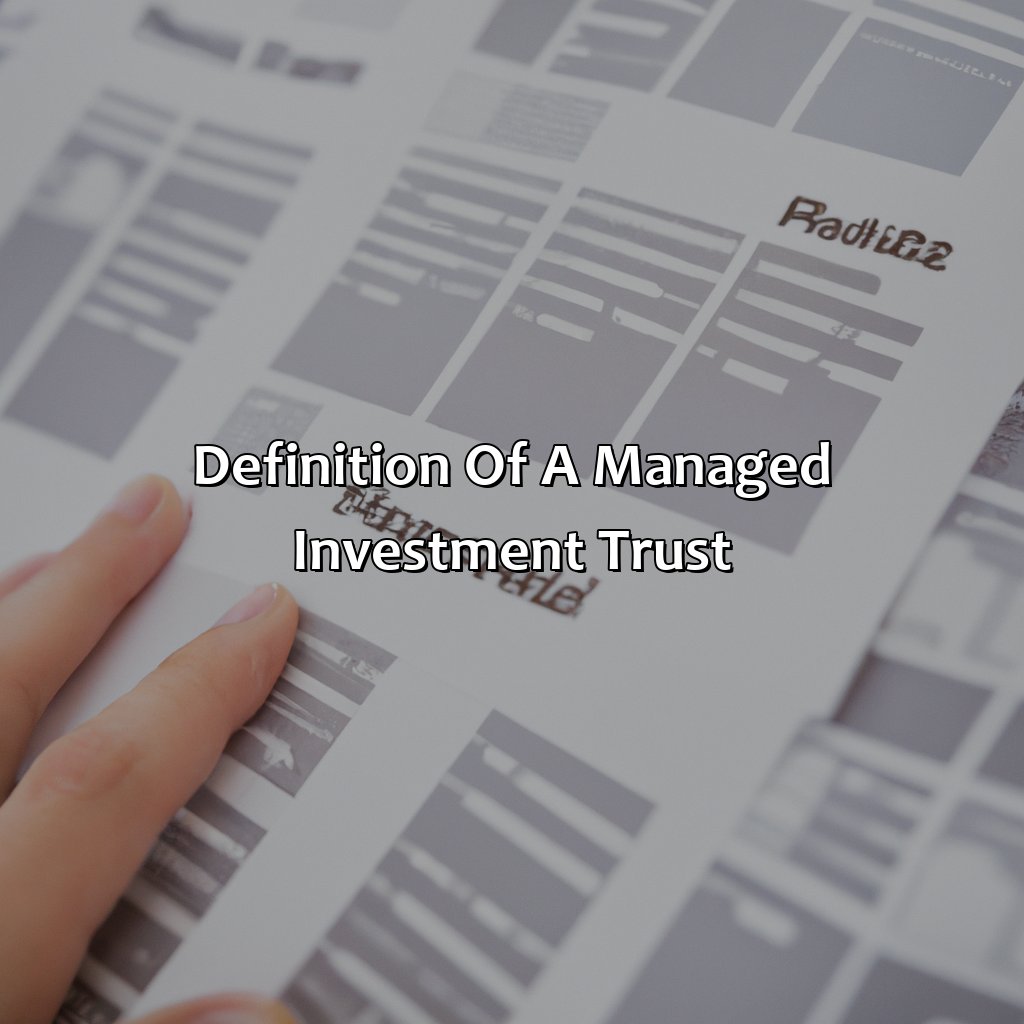
Image credits: retiregenz.com by James Duncun
Features of a Managed Investment Trust
Managed Investment Trusts (MITs) are a popular investment option. MITs usually invest in a variety of assets and have a professional fund manager who makes investment decisions on behalf of investors. Here are three key features of a managed investment trust:
- Professional Fund Management
MITs are managed by professional fund managers who have the expertise to make investment decisions on behalf of investors. They have access to various investment tools and research, enabling them to make informed decisions about the selection and management of investments in the portfolio. - Diversification of Portfolio
MITs invest in a range of assets, including stocks, bonds, and property. This diversification of investments helps to reduce the risk for investors. The fund manager actively manages the portfolio to maintain diversification and ensure that the investments align with the fund’s investment objectives. - Trading Flexibility
MITs offer trading flexibility, making them a suitable option for investors who prefer to have control over their investments. Investors can buy and sell units in the fund at any time, enabling them to respond quickly to market conditions. This flexibility also allows investors to adjust their investment portfolios as per their financial goals.
MITs have some unique details that make them a popular investment option. They are regulated by the Australian Securities and Investments Commission (ASIC). Investors may receive regular distributions of income from the fund’s investments. Generally, investors do not own the underlying assets but instead hold units in the trust.
Don’t miss out on the benefits of investing in a MIT! With managed investment trusts, investors can access professional fund management, diversified portfolios, and trading flexibility. Start investing in MITs today for a more secure financial future.
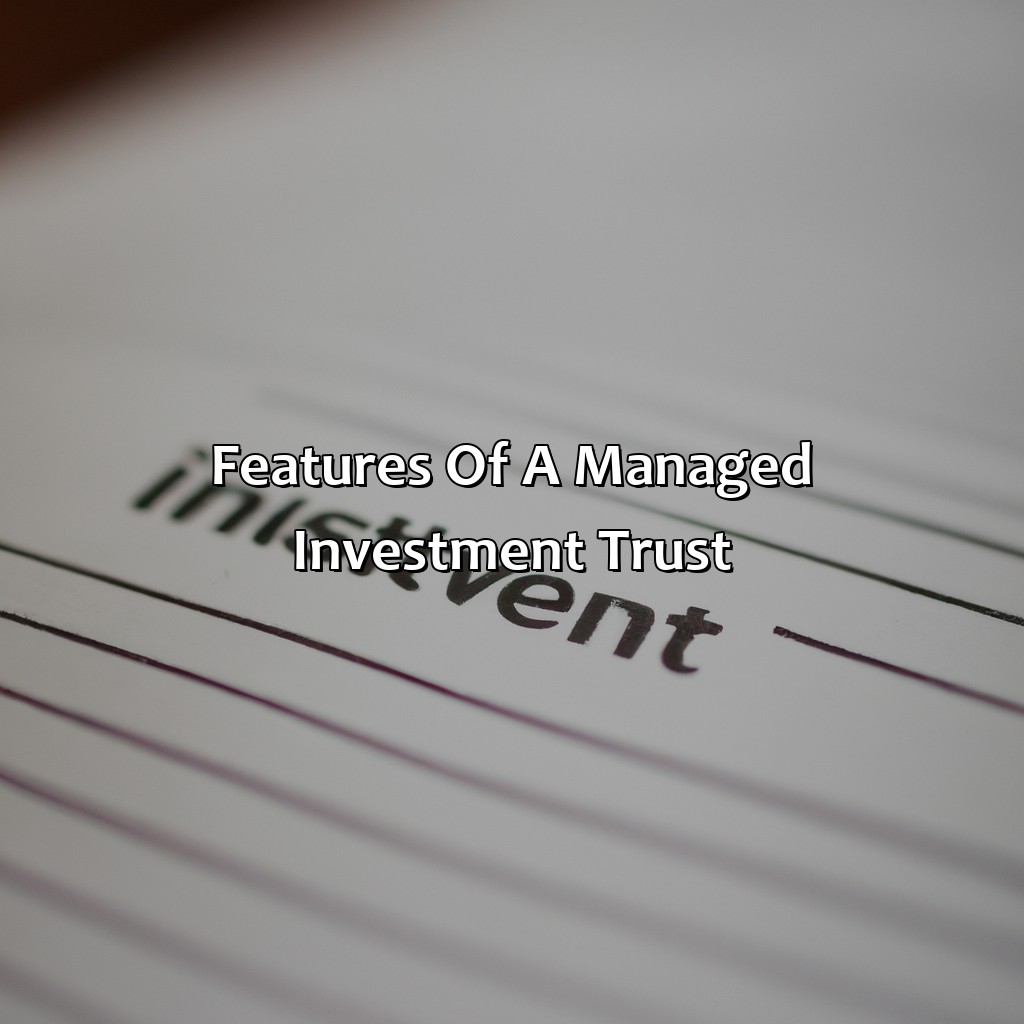
Image credits: retiregenz.com by James Jones
Types of Managed Investment Trusts
A managed investment trust is an investment vehicle where pooled money is invested in various assets managed by a professional fund manager. Here are the various types of such trusts:
- Equity Trusts: This type of trust invests mainly in shares of companies listed on stock exchanges.
- Property Trusts: This trust invests in properties, both residential and commercial, generating income through rent and capital gains.
- Fixed Interest/Bond Trusts: This trust invests mainly in government and corporate bonds, which generate interest income.
- Hybrid Trusts: This trust invests in a combination of equity, property, and fixed interest investments.
It’s important to note that each type of managed investment trust has its own unique characteristics.
Moreover, among all the types of trusts, property trusts have seen significant growth in recent years due to the increased demand for real estate investments.
A true story of a managed investment trust was when, in 2019, a property trust was used to fund the construction of a large commercial complex. The trust’s investment in the project helped the developer build the project and produce broad-scale employment opportunities in the area. This demonstrates the significance of such trusts in funding large-scale infrastructure projects while providing income to investors.
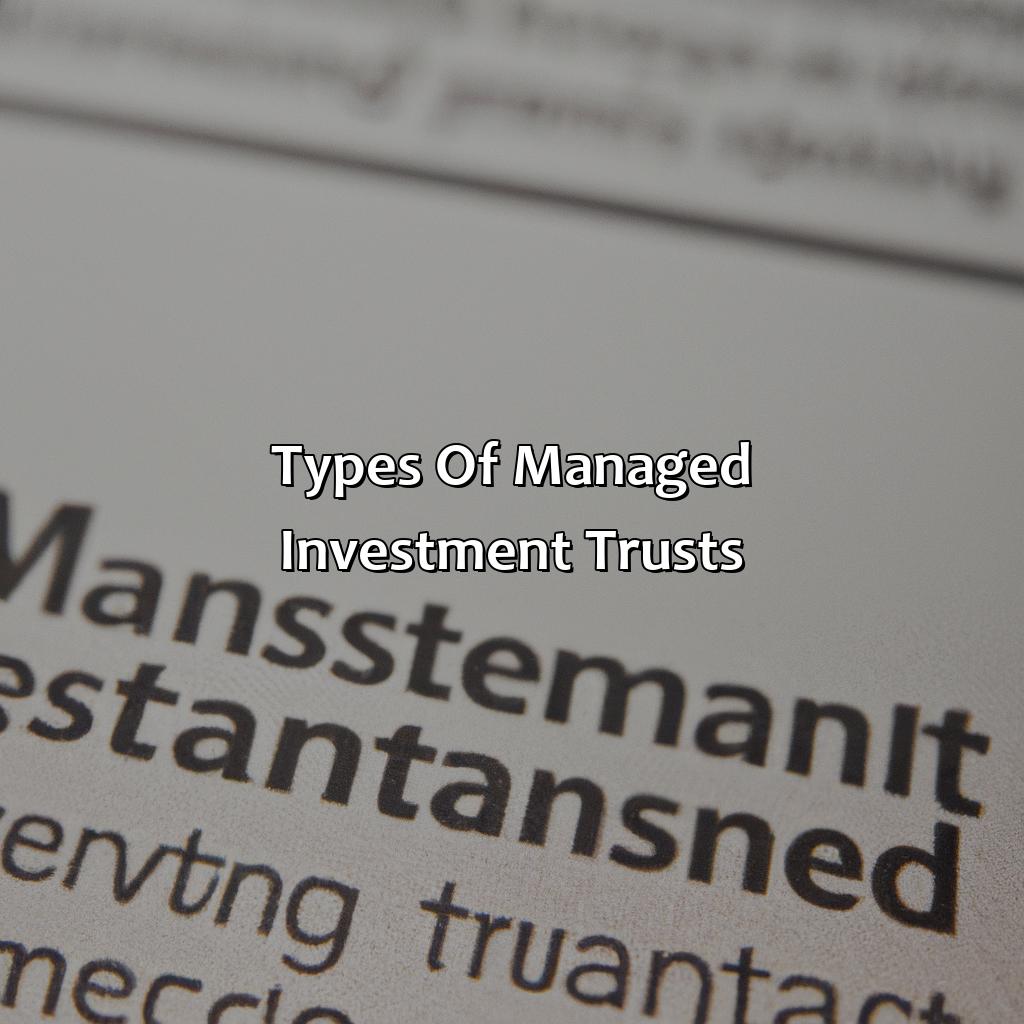
Image credits: retiregenz.com by Adam Washington
Advantages of Investing in a Managed Investment Trust
Investing in a Managed Investment Trust brings several benefits that discerning investors appreciate. These include professional management, diversification, liquidity, and transparency. Additionally, a Managed Investment Trust typically offers access to a wide range of investment opportunities, lower transaction costs, and a convenient means of investing in diverse assets. For the shrewd investor, these benefits mark an excellent opportunity to grow their portfolio and ensure long-term financial security.
Moreover, despite the advantages that Managed Investment Trusts offer, not many investors fully comprehend their workings. For instance, few understand the importance of carefully analyzing a trust’s portfolio before investing. Similarly, not many appreciate the importance of diversifying investments to minimize risk.
A real-life example of an investor benefiting from a Managed Investment Trust remains John, who invested in one such trust that focused on investing in emerging markets, particularly in Asia. Despite the volatility witnessed over the years, John’s investment remained protected and yielded higher returns than traditional investment vehicles such as savings accounts and fixed deposits. This success story underscores the true potential of Managed Investment Trusts in growing one’s wealth.

Image credits: retiregenz.com by Harry Duncun
Disadvantages of Investing in a Managed Investment Trust
Investing in a Managed Investment Trust – The Downsides
Managed Investment Trusts can offer various benefits, but investing in one is not without risks. It is essential to understand these disadvantages before you decide whether this option suits your investment goals.
Disadvantages of Investing in a Managed Investment Trust
Here are four disadvantages associated with investing in a Managed Investment Trust:
- Limited Control: As an investor, you entrust the management of your funds to a professional fund manager. This can limit your control over investment decisions.
- High Fees: Managed Investment Trusts often charge comparatively high fees, which can reduce your returns.
- Limited Transparency: While Managed Investment Trusts provide information about their holdings, they may not disclose all necessary information related to investment decisions.
- Market Risk: Like all investments, Managed Investment Trusts are subject to market risk, which can impact the value of investment.
Additional Points to Keep in Mind
It is essential to consider your investment horizon, investment objectives, and risk tolerance before investing in a Managed Investment Trust. By doing so, you can evaluate whether potential returns justify the risks associated with this investment instrument.
Start Investing Wisely Today!
Investing can be intimidating, but it is crucial to start early to benefit from compound growth. Don’t let the fear of missing out on potential returns prevent you from making informed investment decisions. Reach out to a financial advisor to learn more about investing in Managed Investment Trusts and other investment options suitable for your financial goals.
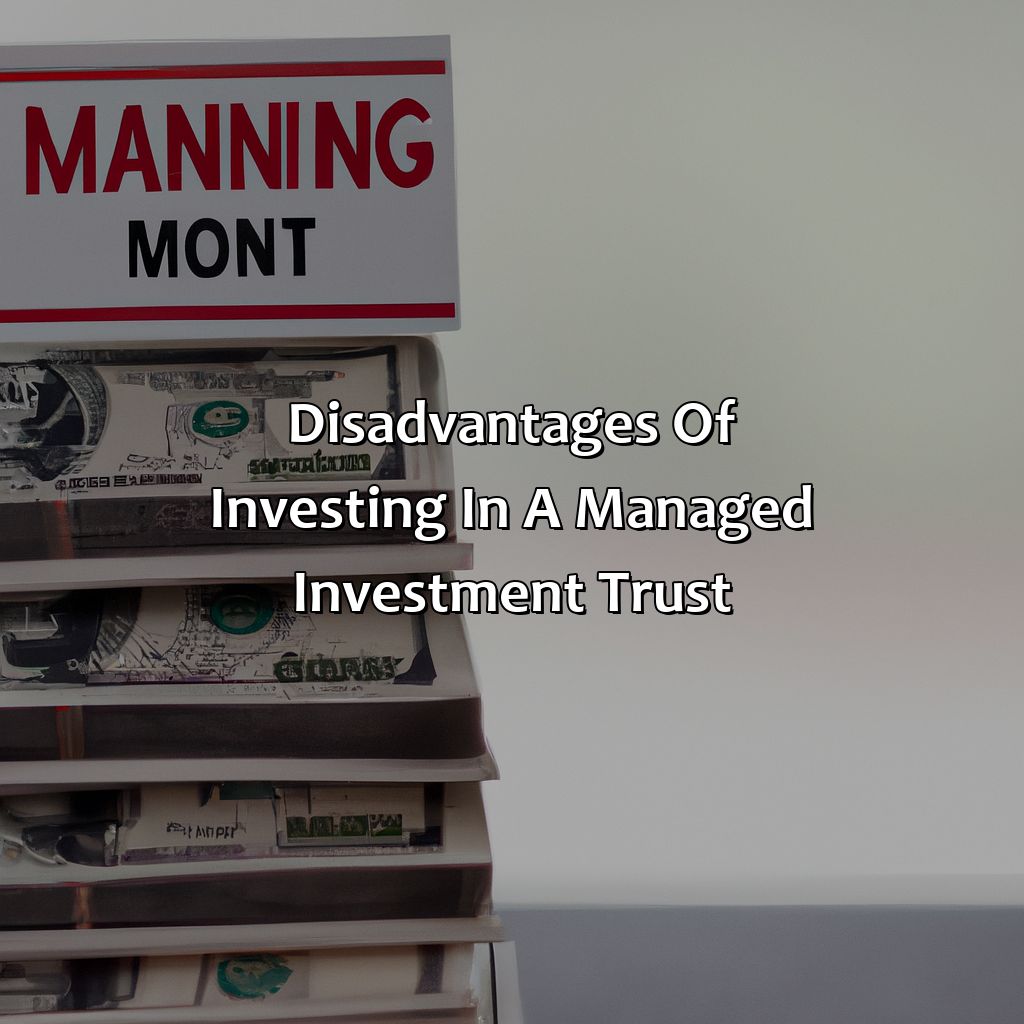
Image credits: retiregenz.com by Harry Woodhock
Some Facts About Managed Investment Trust:
A managed investment trust is a type of unit trust that invests pooled funds in a range of assets such as shares, property, bonds, or infrastructure. (Source: Investopedia)
Managed investment trusts are subject to oversight by a professional fund manager who is responsible for making investment decisions on behalf of the trust. (Source: Australian Securities and Investments Commission)
Managed investment trusts offer investors access to larger and more diversified investment portfolios than they could typically achieve on their own. (Source: Colonial First State)
Managed investment trusts have the potential to generate higher returns than other investment options over the long term, but are subject to market fluctuations and risks. (Source: Canstar)
Managed investment trusts are a popular investment option in Australia, with an estimated $676 billion in funds under management in 2020. (Source: Australian Financial Review)
FAQs about What Is Managed Investment Trust?
What is a managed investment trust?
A managed investment trust is a type of investment scheme where investors pool their money and entrust it to a manager who invests it on their behalf. The manager uses their expertise to invest in a range of assets, such as stocks, bonds, property, and other securities, with the aim of earning a return for the investors.
How does a managed investment trust work?
Managed investment trusts work by pooling investors’ funds together and investing the money in various assets to earn a return. The trust is managed by a professional fund manager who is responsible for making investment decisions and managing the portfolio on behalf of the investors. The returns earned are then distributed to investors in proportion to their investment.
What are the benefits of a managed investment trust?
One of the primary benefits of a managed investment trust is that investors can gain exposure to a diverse range of assets and investment strategies that may be difficult to access on their own. Additionally, the trust is managed by an experienced professional, which reduces the risk of making poor investment decisions. Finally, managed investment trusts typically offer better liquidity than other types of investment funds, which means investors can buy and sell their units more easily.
What are the risks associated with a managed investment trust?
Like any investment, managed investment trusts come with risks. Some of the key risks include market volatility, liquidity risk, and manager risk. Additionally, there is no guarantee that the trust will provide a positive return, and investors may lose some or all of their investment.
How are managed investment trusts different from other investment types?
Managed investment trusts are different from other investment types because they pool the funds of multiple investors and entrust them to a professional manager. Other investment types, such as mutual funds and exchange-traded funds, may have different structures and investment strategies.
How do I invest in a managed investment trust?
Investing in a managed investment trust typically involves purchasing units in the trust, which can be done through a broker or financial advisor. Before investing, it’s important to research the trust’s investment strategy, performance history, and fees, and consider your own investment goals and risk tolerance.
 Checkout this IRS Loophole
Checkout this IRS Loophole 
